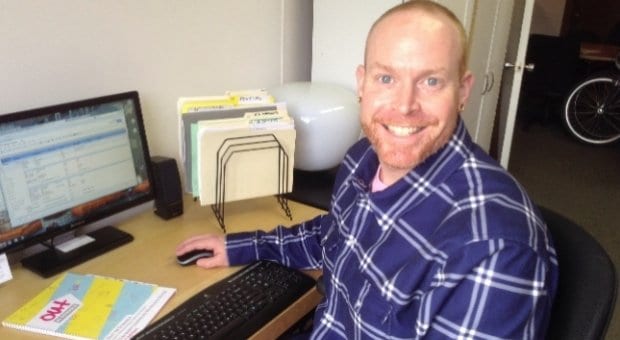After a decade of bringing anti-homophobia films and discussions to schools across BC, Out on Screen’s director of programs and human resources, Ross Johnstone, is taking his experience to a national level.
“I’m sadly leaving the organization to pursue a new career opportunity at the National Film Board of Canada on their education team,” says Johnstone, who for years helped guide Out on Screen’s educational outreach arm, Out in Schools.
Johnstone’s last day with the organization that produces Vancouver’s annual Queer Film Festival will be March 21.
Johnstone says the new career opportunity is a “natural fit” with his experience offering BC students and educators tools to discuss and combat homophobia.
Johnstone helped create Out in Schools in 2004. Since then, the organization has presented hundreds of queer films to more than 50,000 high school students provincewide, often in conjunction with local gay-straight alliances, to facilitate discussions with youth on bullying, homophobia and stereotypes, and to give youth a safe space to explore those issues.
It began as “a way to broach the subject of homophobia and bullying in schools,” Johnstone explains. “The demand for the program was huge. It became its own entity. It grew from a lunchtime-program pilot initiative to now, where we are reaching up to 10,000 students annually.”
Johnstone says the program is having an impact on the language used in schools, “and we’re making an impact on changing the behaviour in schools.”
But the greatest impact, he says, has been the teachers’ responses. “Teachers and educators identify the work we’re doing as not only important but they want to weave us into the curriculum,” he says.
“It’s the teachers who are on the frontlines,” he says. “They see the bullying, they hear the language, and they know where the curriculum gap is.”
Johnstone thinks schools have become more accepting in the last decade. More students are becoming allies, he says. But there is still a lot of work to be done, he says, especially at the government level. At least half of BC’s school districts still don’t have any anti-homophobia policy in place, he notes.
He’s particularly proud of Out in Schools’ work to reach students outside the Lower Mainland through its Rural Outreach Initiative.
“Small trips to rural communities and developing our work in places like the Kootenays and Prince Rupert, has been an exciting endeavour,” he says, adding that the presentations have been generally well received.
Johnstone is confident that Out in Schools will continue to thrive and evolve in his absence. “My goal is that we are able to continue and expand with our demands for programming,” he says.
“My decision to leave is made easier with the knowledge that there’s a strong, thoughtful, talented and experienced team in place to continue the work of OIS and to continue to strive to make schools safer and inclusive and free from homophobia and bullying.”

 Why you can trust Xtra
Why you can trust Xtra


